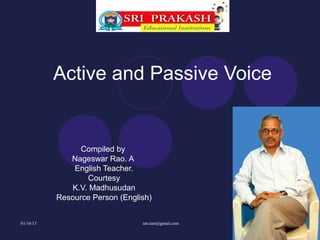
Active & passive voice
- 1. Active and Passive Voice Compiled by Nageswar Rao. A English Teacher. Courtesy K.V. Madhusudan Resource Person (English) 01/16/13 anr.tuni@gmail.com
- 2. A Transitive Verb has two voices: - the ACTIVE - the PASSIVE A Verb is said to be in the Active Voice when the person or thing denoted by the Subject acts or is active. A verb is said to be in the Passive Voice when the person or thing denoted by the Subject does not act, but suffers the action done by something or by someone. a. The hunter shot the lion. b. The lion was shot by the hunter. Both the sentences mean the same thing. But in the first sentence, the Subject (the hunter) is the doer or the action (shot). In the second sentence, the Subject (the lion) is the sufferer or receiver of the action (was shot). 01/16/13 anr.tuni@gmail.com
- 3. The Passive Voice is used when the Subject of the Active Voice is unknown, unimportant or vague. He was killed in the last War. The ship was sunk hardly a kilometer off shore. Food was distributed free of charge. His house was burgled last night. ACTIVE FORM PASSIVE FORM 1. Simple Present. 1. Simple Present Sub + Base form of Verb + Obj. Sub + am/is/are + V3 + by + Obj. The cat chases the rat. The rat is chased by the cat 2. Present Cont. 2. Present cont. S + am/is/are + V4 + O S + am/is/are + being V3 + by + The cat is chasing the rat. O The rat is being chased the cat. 01/16/13 anr.tuni@gmail.com
- 4. 3. Present Perfect 3. Present Perfect S + Has/have + V3 + O S + has/have + been V3 + by + O The cat has chased the rat. The rat has been chased by the cat. 4. Simple Past 4. Simple Past S + V2 + O S + was/were + V3 + by + O The cat chased the rat The rat was chased by the cat. 5. Past Cont. 5. Past Cont. S + was/were + V4 + O S + was/were + being + V3 + by + The cat was chasing the rat. O The rat was being chased by the cat. 6. Past Perfect 6. Past Perfect S + has/have + V3 + O S+ has/have been + V3 + by + O The cat has chased the rat. The rat has been chased by the cat 01/16/13 anr.tuni@gmail.com
- 5. 7. Simple Future 7. Simple Future S + shall/will + V1 + O S + shall/will + be + V3 + by + O The cat will chase the rat. The rat will be chased by the cat. 8. Future Perfect. 8. Future Perfect S + will/shall + have + V3 + o S + will/shall have been + V3 + by O The cat will have chased the rat. The rat will have been chased by the cat. Transitive Verbs having two objects He taught us English I was taught English by him (or) English was taught to me by him. Prepositional Verbs The cat looked at the rat The rat was looked at the cat. 01/16/13 anr.tuni@gmail.com
- 6. Auxiliary Verbs: You must do this job. (Active) This job must be done by you. (Passive) Interrogative Sentences. Has he completed homework? Has the homework been completed by him? Is the cat chasing the rat? Is the rat being chased by the cat? Imperative Sentences: Do it. Let it be done. 01/16/13 anr.tuni@gmail.com
- 7. Visit us at “ayalasomayajula nageswar rao” For More videos on Functional & Usage Grammar. 01/16/13 anr.tuni@gmail.com
